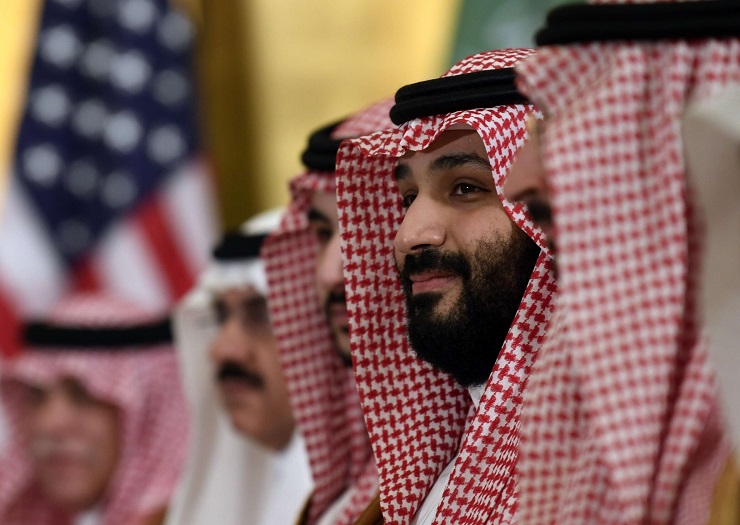The recent escalation of the war in Yemen is coupled with a growing US distancing from the Saudis, which signals that the winds might be fundamentally shifting in Yemen to the ultimate disadvantage of Riyadh. Over the past month, the Houthis rebels have really upped the ante with their attacks inside Saudia Arabia that targeted airports, oil facilities and military infrastructure. While the recent escalation could be a part of the Houthi push to gain leverage vis-à-vis the Saudis ahead of the up-coming round of talks, the war in Yemen has, more than anything else, eroded Saudi dominance in the Gulf, and the Muslim world in general. This erosion plus Saudi defeat in Yemen is unfolding in ways that could potentially end the era of Muhammad bin Salman (MBS) as Saudia’s king even before its formal reign begins. Nothing shows this better than Joe Biden’s decision to publicly sidestep MBS and speak to the King himself.
Whereas this decision does speak volumes about the growing unpopularity of MBS in the US, what the King and POTUS discussed, too, holds crucial importance. As some media reports have suggested, there is every possibility that Biden would have suggested to the King that he should reconsider his choice of successor and bring back Prince Muhammad bin Nayef, who was once crown prince of Saudia before the MBS-storm hit the kingdom. A report published by The Times recently disclosed that Joe Biden is under pressure to secure the release of ‘America’s Favourite Saudi’. This appears to be a tactic targeted at directly undermining MBS’ legitimacy as the crown prince. While it is not clear as to whether the US will get directly involved in the succession struggle, it has become clear that Washington will support Nayef which may result in a new round of palace coups. In pursuing this, the US will duly be assisted by the way the war in Yemen has reached very much inside the heart of Saudi Arabia, including its capital Riyadh.
The release of the report on Khashoggi murder and MBS’ direct implication suggests the way the US is directly discrediting the existing crown prince. While the US did stop short of actually sanctioning MBS, it is apparent that Joe Biden, as a Washing Post editorial noted,
“is putting a stop to the grotesque and unprecedented coddling of Saudi Arabia by former president Donald Trump. MBS enjoyed privileged access to the White House through Mr. Trump’s son-in-law, Jared Kushner; the new administration has made clear that communication between Washington and Riyadh will occur through normal channels, with Mr. Biden speaking to King Salman, the titular head of state.”
The US decision to stop short of sanctioning MBS has its own reasons. There is too much at stake right now for the US to directly confront Riyadh.
At the same time, however, there is a growing evidence that the Joe Biden administration does not have much love for MBS and would ideally want to see another man as the next king. The US, in this context, appears to be relying heavily on the war in Yemen and less on directly punishing MBS. The US, accordingly, is steering the course of the war in Yemen in ways that directly undermines MBS’ political interests.
Despite being allies, some recent steps the US administration has taken show that the Biden administration is paving the way for an ultimate Saudi defeat in Yemen. While the US Secretary of Defense recently reiterated US support for the Saudis against Houthis attacks, it remains that this assurance has not yet translated into action.
Not only has the Biden administration stopped US supporting Saudi war efforts in Yemen, but it has also announced plans to reverse an 11th-hour Trump administration decision to label the Houthis as a foreign terrorist group. Such steps are directly emboldening the Houthis, making it much harder for the Saudis to withdraw from Yemen and find a face-saving solution to the conflict.
At the same time, the US has resumed USAID assistance to the rebel-controlled areas of Yemen.
The US Agency for International Development, a federal agency that administers foreign aid, recently gave formal notification to the US Congress and partner agencies operating in the country, stating it would restore funding to northern Yemen.
Now, the fact that the war in Yemen was MBS’ personal adventure and that the burden of failure, too, would fall directly on his shoulders could have massive repercussions at both domestic and regional levels.
This is how a Houthi victory and a humiliating Saudi defeat could end up consuming Muhammad bin Salman’s political aspirations long before he formally becomes the King.
It has already put into question MBS’ ability to steer the kingdom’s foreign policy in the right direction, and prioritize national security decisions. The question that the kingdom’s political elite would soon be evaluating would is the ability of the crown prince to navigate the Kingdom through a turbulent geo-political period. At the same, the figure of Muhammad bin Nayef continues to lurk in the background, a leader that has both the capability and the will to reset Saudi position in the region and align it more closely with that of the US.
Salman Rafi Sheikh, research-analyst of International Relations and Pakistan’s foreign and domestic affairs, exclusively for the online magazine “New Eastern Outlook”.

